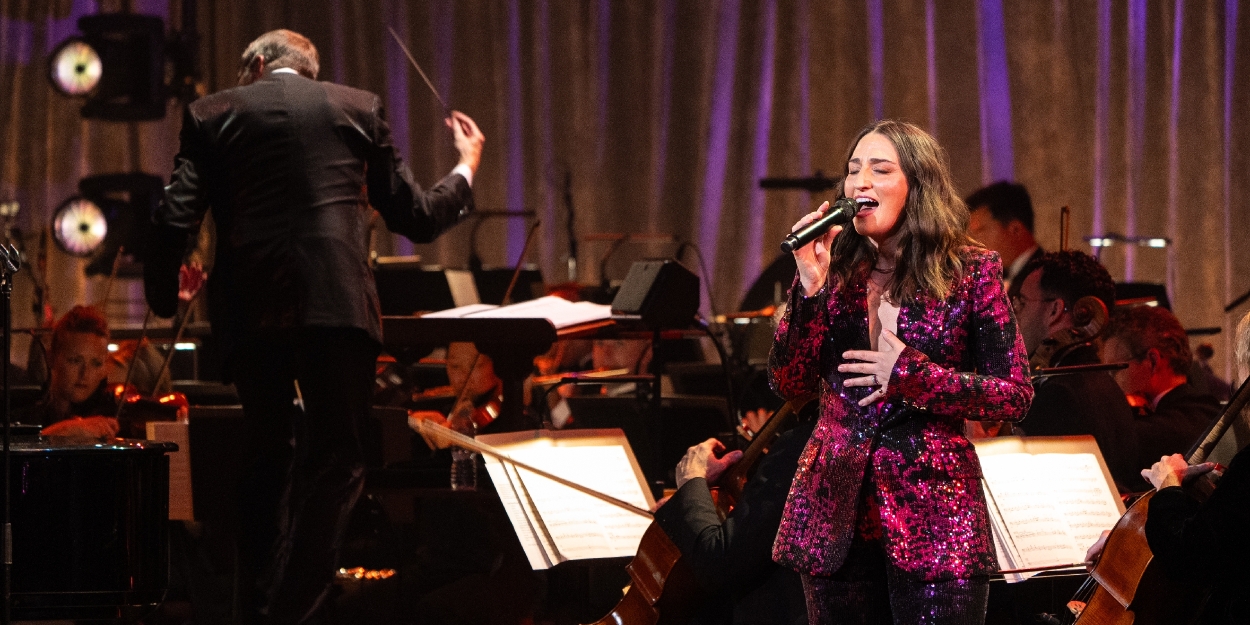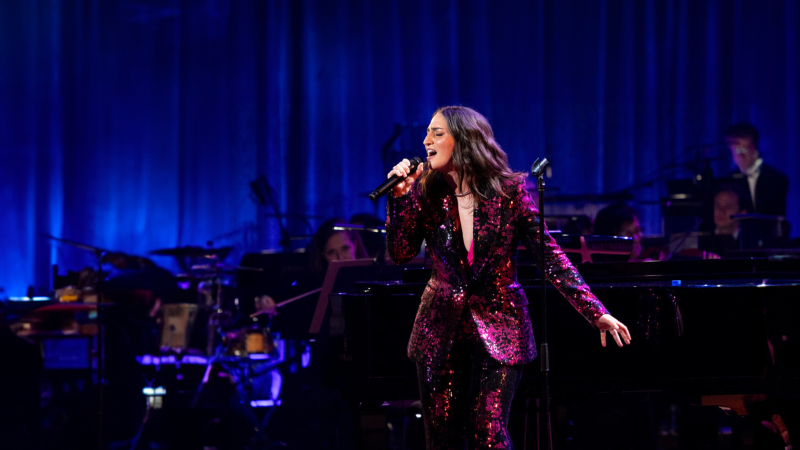Exclusive: Sara Bareilles Reflects on Kennedy Center Concert, New Experiences, and the Year Ahead
Sara Bareilles: New Year's Eve with the National Symphony Orchestra & Friends airs Tuesday, December 31, 2024 8:00 pm-9:30 pm ET on PBS.

Sara Bareilles has seemingly done it all.
In addition to her remarkable solo career, the singer/songwriter wrote and starred in the major Broadway musical Waitress, led the television comedy Girls5eva, and played the Baker's Wife in the 2022 Broadway revival of Stephen Sondheim's Into the Woods, earning her much praise- including a Tony nomination.
One thing she hadn't done, however, was an orchestral concert of her music. 2024 saw the performer embark on this new endeavor, working with her collaborators to debut orchestral arrangements across two legendary venues: the Hollywood Bowl and the Kennedy Center. For the latter show, spanning three nights, Bareilles performed alongside several special guests including Rufus Wainwright, Emily King, and David Ryan Harris.
As part of PBS' Next at the Kennedy Center program, the concert was recorded and will air on New Year's Eve where viewers can ring in the new year with a joyous collection of both familiar and new songs from Bareilles.
Ahead of the airing, BroadwayWorld sat down with the performer and songwriter to discuss planning the concert, performing with her musical heroes, and her thoughts as she looks ahead to a new year.
This interview has been condensed for clarity and length.
How did you collaborate with the National Symphony Orchestra and conductor Steven Reineke to develop the arrangements for this performance?
The whole experience of playing with an orchestra is brand new to me. The first time it happened was for the Hollywood Bowl over the summer in Los Angeles. Months prior to that, you engage arrangers and orchestrators. I worked with David Campbell out of Los Angeles and Rob Moose who came with me to the Kennedy Center, and we built out arrangements for the orchestrations of the songs. We learned a lot from the Hollywood Bowl show and then did another set of refinements for the Kennedy Center.
Steven Reineke, who is our maestro, was an incredible collaborator throughout the whole process. It's interesting because I don't have a music theory background so I don't really speak music as you do when you're in a classical setting.
So much of it was a crash course in orchestral music and also the fun of finding where pop and orchestra orchestral music collide. I can't say enough about the National Symphony Orchestra's generosity, support, and willingness through those whole three days. It was an intense time because they were on the verge of a strike.
How long did you have for rehearsals?
You run through the show one time on the day of her show, and that's the rehearsal. On the first day at Kennedy Center, we load in quite early, and then in the afternoon, you do a run-through with the orchestra for the first time. That's for sound, but it's also really just to hear the arrangements for the first time- and it's the first time the orchestra's playing them. You don't have the luxury of a lot of time. So it's harrowing, I'm not going to lie.
That's probably an incredible experience to hear those orchestrations come to life for the first time.
It's bonkers. It's so stunning. Playing with an orchestra is technically much more challenging than I was anticipating. There's a certain amount of latency that happens on stage because of the size of the orchestra and the way sound works in space. It almost feels like you're not quite together, but that's not the experience of the audience in front of you. I felt so happy to have three shows in a row because the first time you do anything, it's a little wobbly.
How did you go about selecting those who joined you for the show?
I'm so lucky to have a big community of artists that I love and look up to. I think one of the main criteria for choosing is who's a great hang. Life is short. Let's make art together and make it with good people.
This was the first time I got to meet Rufus Wainwright. I have been a super fan of his since I was in my late teens, and we had an Instagram exchange. I was wearing a Rufus Wainwright t-shirt and he was like, "I like your t-shirt." And I said, "I dare you to let me close to you." [laughs] And then I invited him to come sing and he said yes. I was kind of shocked, but I was over the moon.
I'm curious how you decided on the setlist. Was there sort of a specific arc or story you wanted to tell through the songs that you chose?
I wanted to make sure that we had a nice, healthy representation of my more well-known songs that have never been heard in this context. I wrote "Gravity" when I was 18 and I've been playing that song for 30 years. As an audience member, I know the way I feel when an artist doesn't play the song that I've loved. I couldn't not bring "Love Song."
We were lucky to be given such a big time slot with 90 minutes so I felt like we could also include my love of musical theater with a new song from a new musical and a new song called "Hands Off My Body" that is inspired by the women's movement right now. I think we did a good job of balancing what people already know and love and also introducing some new material.
What inspired you to debut "Enough" from The Interestings during this event?
The themes of "The Interestings" novel feel so important to me, especially in our cultural zeitgeist right now. The idea of "When is it ever enough? When are we going to allow ourselves to be content? When can we stop fixating on what we don't have?" I think those themes in the novel are really tenderizing and important. I wrote the song before I'd even finished the novel because I was so moved by one passage in the book. It was a nice synergistic moment of wanting to open up the aperture and show the world what I've been working on in this capacity. The musical is not completed yet, but it felt really important to me to share that. There's something delicious about getting to share it in this form because we won't be able to play it with an 80-piece orchestra that way.

Obviously, performing live means that things sometimes happen that aren’t planned. Was there a moment during one of your performances that surprised you?
On the third night, the audience would not stop giving standing ovations in a way that was so precious. It was just making me laugh because they just kept standing up over and over again. It was joyful. My partner Joe Tippett's, whole family is from that area so they all came over the three nights, which was really meaningful.
Going through the possibility of the strike was intense. That happened on the first day and it was a real practice of meditation and surrender because there was the chance that this might all go away. What does it mean to make peace with that? When they agreed to stay for the shows, it was very emotional. I am a union supporter 10000% so I spoke to them and said, "I'm standing with you. Do whatever you got to do." It was very meaningful that they played.
I am curious about your approach to songs from musicals outside of the context of shows. Even though they are written for a particular moment and character, they often will take on a life of their own. As someone who has written both songs on their own as well as songs within the context of a show like Waitress, what is the difference between your approach to these?
There's a strange kind of connection between specificity and universality. They feel like they're polar opposites, but they're closely braided together. I remember writing "She Used to Be Mine" and feeling a little bit sheepish about sharing that song in a show because I played it in a concert before it was ever a part of the show. But it was written specifically for the musical.
There is the line, "She is all of this mixed up and baked in a beautiful pie" and I thought, "I can't have the word pie in the song!" But it was a really beautiful teacher, that song. My hope in terms of composing for musical theater is to stay laser-focused on articulating these kinds of emotional architectural moments. We are building out the inner life of these characters and, at its best, that experience can transcend the package. If you have a song like "When He Sees Me" from Waitress, it is very character-specific, but the experience of feeling seen or vulnerable is a universal experience. There is a world where a song that you think only can live in one place does take on another life if people are invested in going on the ride.
The Kennedy Center has hosted so many iconic performances over the years. Was there a particular concert or moment from its history that inspired you as you prepared for your own concert?
That place is so steeped in history. I was at the Kennedy Center Honors for Carole King and that was the night Aretha Franklin came onstage. Watching President Obama shed a tear because she was singing was an incredible moment and one that sticks out the most to me.
That night, I sang "You've Got a Friend?" and James Taylor played right before I did. Before we went on he said, "Would it be okay if I play the next song with you? I love that song." I was like, "Yes, James Taylor, you can play the guitar." [laughs] It was insane. That is a night that I think about because I was swimming in this experience with my musical heroes.
The concert is going to debut on New Year’s Eve. Did you know it would be a New Year’s Eve concert? Did that date influence how you approached the show?
We knew it would be a New Year's Eve concert. My resolution ritual is to pick a word for the year. This last year was "creation" and the concert felt in alignment with that idea of taking a big swing and doing something that was going to ask me to stretch and grow. I love doing things that put me in this sense of a beginner's mind. As much as it's anxiety-inducing and terrifying, I find that I grow the most from those experiences. Moving into this next year, especially knowing what kind of atmosphere we're walking into politically, I have to really meditate on what it will be. But I think it's about resolve and a sense of resoluteness and focus. We can't succumb to outrage and despair- that would be too big a loss.
Sara Bareilles: New Year's Eve with the National Symphony Orchestra & Friends airs Tuesday, December 31, 2024, 8:00 pm-9:30 pm ET on PBS.
Photo credit: Mauricio Castro
Videos

